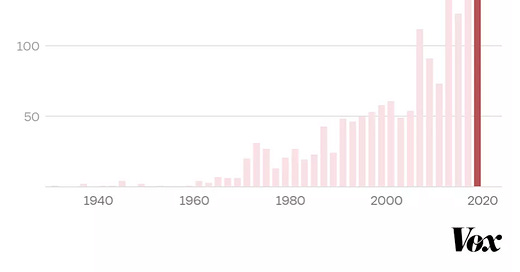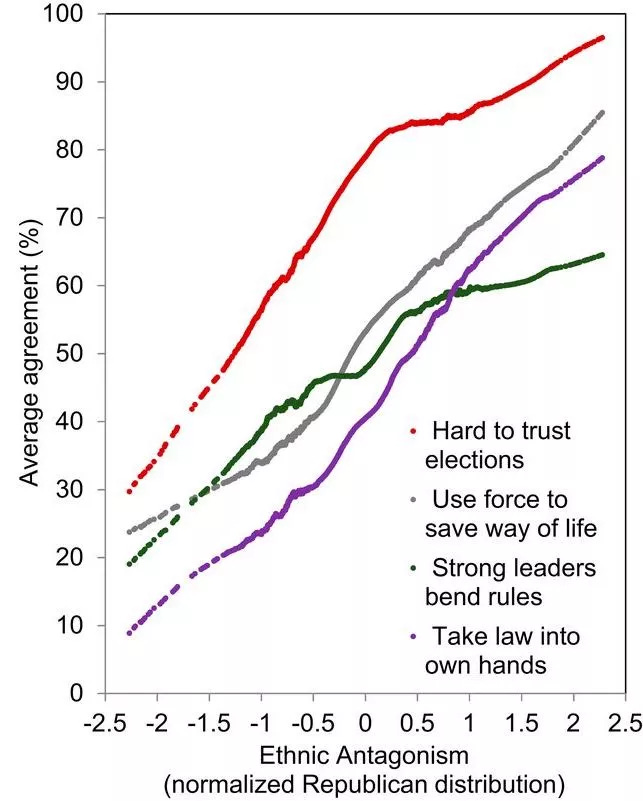The week America revived its democracy 📊 March 7, 2021
With HR1 and filibuster reform on the docket, Democrats lead the charge against minority rule
A note: Thanks as ever for reading my weekly data-driven newsletter on politics, polling, and democracy. As always, I invite you to drop me a line or leave a comment below with your thoughts. Please click/tap the ❤️ under the headline if you like what you’re reading; it’s our little trick to sway Substack’s curation algorithm in our favor. If you want more content, I publish subscribers-only posts roughly twice a week.
Americans can pick one of the following two things, but they cannot have both:
The filibuster
A majoritarian democracy
Somehow, over the past week, the reality of the anti-democratic nature of the US Senate’s legislative filibuster really appeared to set in in Washington and among the chattering class. Once held up as a necessary means to compromise and bipartisanship in the senate, a panacea both for polarization and the excesses of popular democracy that plagues the House of Representatives, more pundits than ever are indicting it as a direct threat to progress and majority rule.
Perhaps it was the Senate parliamentarian declaring that Democrats could not raise the minimum wage via budget reconciliation, the process that lets the Senate pass certain legislation with 51 votes, avoiding the 60-person cloture vote. Or maybe it was the incredibly high stakes of democracy reform and HR1; Republicans have made clear they intend to tilt the electoral scales in their favor by whatever means necessary. Last week, a lawyer representing the Arizona GOP was asked by Justice Amy Coney Barret why they should keep rules preventing voters from casting their ballots at any precinct in their area, rather than a specific one they had been assigned (an overly-burdensome restriction, voting rights advocates attest. The lawyer, Michael Carvin, responded:
Because it puts us at a competitive disadvantage relative to Democrats. Politics is a zero-sum game. And every extra vote they get through unlawful interpretation of Section 2 hurts us, it’s the difference between winning an election 50-49 and losing an election 51 to 50.
In Arizona and 42 other states, Republicans have introduced bills to enact similarly restrictive laws. Given the absence of voter fraud in America, one does not have to wonder whether the true intention is to game the system to win elections with effective minorities of the vote. If new proposals in Georgia to forbid mail-in ballots and stop early voting on Sundays (a day with disproportionately high African American turnout) had been on the books in other close states in 2020, Joe Biden may not have won the presidency. The intention is clear: to subvert majoritarian rule.
It’s not like Democrats are overreacting here. Recent political science evidence suggests the Republican Party is among the most anti-democracy in the world — on part with the far-right parties in Turkey and Poland.
Other surveys have found that their support for restrictions on voting are driven by antagonism toward other ethnicities:
These charts give plenty of reason to believe the interpretation that Republicans are trying to decrease access to the polls because they don’t want non-whites voting — against them.
While Republicans have been becoming ideologically anti-democratic and proposing new laws that would prevent many voters from casting ballots against them, Democrats have been on the offensive. Since they are not strong enough in many states to protect access to the franchise, they have decided to do so via Congressional legislation. They passed House Resolution 1: For the People Act of 2021 (HR1 for short) this week, a bill that will get rid of partisan gerrymandering, enact automatic and same-day registration, increase the availability of vote-by-mail and early voting and limit the routine removal of voters from voter rolls — among other things. Democrats have adopted as conventional wisdom the idea that they must pass HR1 to avoid wrongfully losing power due to Republicans restricting the pool of eligible voters beyond its rightful definition — rather than losing power the right way: because you did something wrong and the people voted you out.
But even if you don’t agree that the GOP’s competitive authoritarianism justifies democracy reform, you still have to acknowledge the depressing reality of American politics today — and ponder potential solutions. Nothing gets done (in part because of the filibuster, in part because of other roadblocks); partisans anger has risen to unprecedented levels; government turnover is getting more frequent, bringing massive swings in regulatory policy; and the desire for a third party, and a more civil politics, has reached all-time highs. People want a better democracy. Inherently, this means they want positive institutional change.
Yet the filibuster stands in the way of broad democracy reform. Republicans have pledged to block it, and Joe Manchin and Krysten Sinema have opposed adopting new Senate rules that would get rid of it.
At least, that was the case until this morning, when Joe Manchin went on NBC and Fox News to declare he would support reforming the filibuster to make it harder for senators to use it as a breathless threat against something they don’t like. Specifically, Manchin has come out in support of something called the “talking filibuster,” which requires 40 senators doing the filibustering to physically hold the floor of the Senate and do the whole Mr Smith Goes to Washington “No I will not yield!” thing.
Until now, the door to reform has been closed. American democracy has been in a downward spiral of gridlock, negative partisanship and authoritarian populism. We have been in a “doom loop” of two-party politics, to use Lee Drutman’s word. America has been trapped in an anti-democratic whirlpool. The filibuster has stood as an arcane roadblock to progress, an accident of history, a potentially-unconstitutional default agreement between senators that has long prevented debate and progress, contrary to what the filibusters proponents claim (without evidence).
Finally, for now, Joe Manchin has appeared to crack the door open to a better, more (but not fully) majoritarian government. He says he will not end the filibuster, but might at least add another exception for election laws or make filibustering harder (closer to what it should be). Democrats should slip through the door while they can.
Posts for subscribers
March 4: The doom loop and the anti-democratic whirlpool. A conversation with Lee Drutman about the authoritarian trajectory of American democracy — and the ways out
I also hosted the usual Sunday subscribers thread where we talked about the filibuster, minimum wage, and cabinet confirmations.
What I Wrote
Last week was a light one in terms of publishing — I focused instead on some longer-term projects that require a lot of coding. I will spill more beans on this soon. For now, here is my column discussing the reason why some Republicans vote against their economic interests, and why Republican lawmakers didn’t bow to public opinion polls on the covid-19 relief bill.
I also rewrote a fair bit of my book, getting the manuscript very close to a place where I’ll be happy sending it to my editor. There is still much to be done.
What I’m Reading
I picked up a few books last week. Heather McGhee’s The Sum of Us and Jonathan Sacks’ Morality are now both on my to-read shelf.
I highly recommend this piece by the Washington Post’s Christopher Ingraham: “How to fix democracy: Move beyond the two-party system, experts say”
Here’s an article from FiveThirtyEight’s Perry Bacon Jr on Why Republicans Don’t Fear An Electoral Backlash For Opposing Really Popular Parts Of Biden’s Agenda.
538 also published an article by Emily Ekins, the polling director for the Cato Institution, on potential explanations for last November’s polling error.
Relatedly, Pew has a big new report on the implications for issue polling of pro-Democratic biases in pre-election polling. They are relatively small for good polling like Pew’s (I wrote about why this would probably be the case like two months ago) but don’t discount the potential variation from reality among lower-quality pollsters — especially on questions that are correlated with partisanship.
The New York Times is starting up a new polling blog, which is very cool and good for communicating the will of the people to a broader and influential audience, but I don’t know why they didn’t give it a good title like “Poll Watcher" or “Strength in Numbers” or even just “The Times political polling blog.” That’s a missed opportunity, in my opinion. (Please add a comment below with your suggestions for a better name. Maybe the Times will see this and use it.)
Check out this informative compilation of data from Vox’s Zack Beauchamp, showing the Republican Party’s “revolt against democracy, explained in 13 charts”
One of my colleagues Johnny Williams has an excellent piece in The Economist this weekend documenting the increasing tension within the evangelical Christian community over Trumpism and mass political participation.
Feedback
Thanks for reading today. If you have any feedback, please send it to me at this address — or just respond directly to this email. I’d love to hear from you. If you want more content you can sign up for subscribers-only posts below. In the meantime, follow me on Twitter for related musings.







Hi Elliott,
Manchin is suggesting a solution that is pretty good. This was one of my comments from last week which is still relevant.
In It's Even Worse Than It Looks by Thomas Mann and Norman Ornstein, they suggest several ways to reform the filibuster. Eliminating the filibuster except for the filibuster on the bill itself would save time and allow the majority leader to bring a bill to the floor without a monition to proceed. Mann and Ornstein argue that the minority should provide 41 votes to continue the debate or change the number of votes needed to achieve cloture to 60% of members who are present and voting.
-Elliot